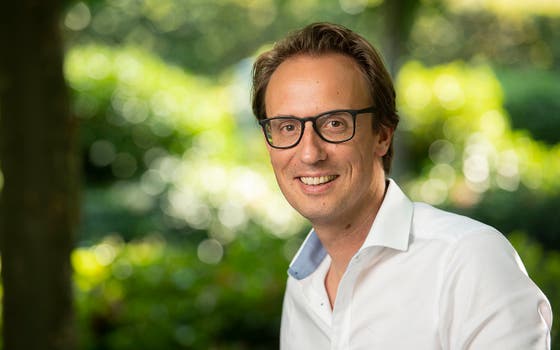Grant for AI models in rare diseases

Internist haematologist Eduard van Beers (UMC Utrecht/ U-trial) and 16 international partners have been awarded a €7 million grant for the SYNTHEMA project. In this project, the researchers will apply new techniques to train the algorithms in their AI model. This is necessary to better predict the disease course of patients with rare diseases.
"For a disease such as sickle cell disease, it is very important to predict in the first years of life what will happen later on," Van Beers says. "This gives a paediatric haematologist the opportunity to decide early on whether a heavy therapy - such as stem cell transplantation - is a good option for the patient. Timing is important. Doctors want to treat before a patient is too sick to handle another heavy treatment."
Supercomputer
The SYNTHEMA project is a continuation of Eduard van Beers' activities within the ERN Eurobloodnet and the European GENOMED4ALL project and focuses on data from patients with a rare disease. Within this project a predictive AI model is used. In the SYNTHEMA project, researchers work with the latest data techniques: federated learning and synthetic data. "We also add data such as MRI images and data about genes and metabolic processes," says Van Beers. To process this data, we use the supercomputer on the CINECA campus; one of the most powerful supercomputers in Europe."
To provide insight into what the researchers are doing, Eduard van Beers draws a comparison. "Our AI model that predicts disease severity in the future can be compared to how the AI in a Tesla predicts the effect of traffic. They are machine learning algorithms that you can train using data. The artificial intelligence (AI) in Tesla cars is no longer trained on the road in real traffic situations, but Tesla's AI is trained in a fictitious environment in which many different traffic situations are simulated. Researchers call this synthetic data. Because the Tesla AI can now practice many more situations, it can 'learn' much faster and become better than if it were driving around in a real car. "In medicine, like Tesla, we are also going to offer our AI model 'synthetic patient data' to learn from. That way we can improve our AI model!"
Benefits
Testing the applicability of the technique of federated learning and synthetic data to achieve better disease prediction is the goal of the SYNTHEMA project. "This could be the basis for application in many more rare diseases where there is little data," says Van Beers. "If you then consider that 1 in 10 Europeans has a rare disease you can imagine that the impact of this research is potentially very large."
Consortium formation and U-trial
Besides the content of the work being of potential importance, the grant also illustrates how, by working together with European co-researchers, you can win a large grant and undertake large projects that can be of importance to the entire healthcare system. Actively participating in a European Reference Network (ERN) such as Eurobloodnet, can be a way to set up a consortium relatively easily. From U-TRIAL we encourage these kinds of collaborations. U-TRIAL is the clinical trial knowledge and expertise centre of UMC Utrecht for both established PIs and young research talent (internal) and for external stakeholders such as CROs, pharmaceutical companies, medical devices, and diagnostic companies. Each strategic spearhead has a representative within U-TRIAL from whom you can seek advice and expertise for setting up consortia and trials. Read more about it.
